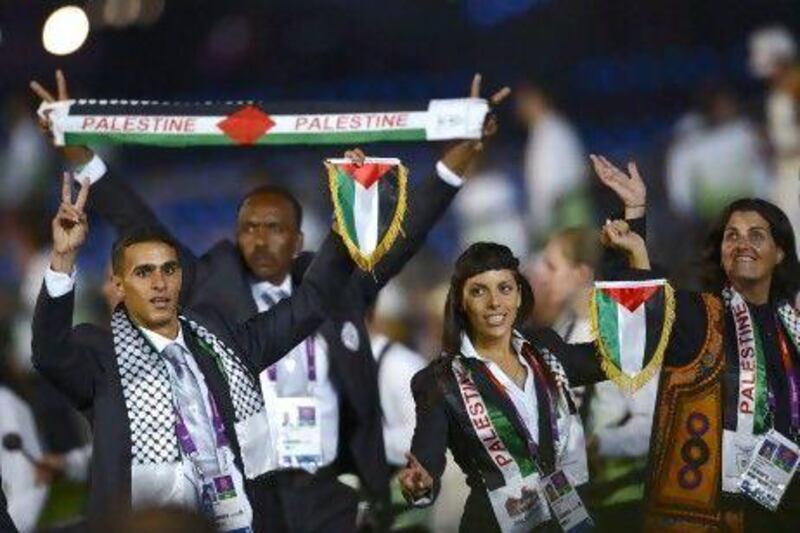LONDON // Diversity was a key part of London's bid to host the 2012 Olympic Games and the city billed itself as "the most multicultural city in the world". It was a bold and complicated claim.
With every nation in the world supposedly already represented in the city - Newham borough alone, site of the Olympic Stadium, is one of the most ethnically mixed in the UK capital - it seemed inevitable that it would in some way define the Olympic experience for London and its visitors.
But would it prove a divisive element? Would it split the loyalties of the "home crowd" into as many splinters as there are communities living in London? That was the question pondered by social commentators as the Games approached.
Well, now they have their answer. Jamaican flags flicker alongside ones supporting Team GB in the streets of Brixton.
Voice of Africa Radio, based in a small studio just a few minutes walk from the Olympic Park, broadcasts support for its chief executive Space Clottey's home team of Ghana and his "second home" of Britain alike.
Brazilian restaurants are decked with their countries flag and the Union Jack, and the same is true in the city's many South African and Australian theme bars and cafes.
Everybody, it seems, has two teams to support. Carried along by the excitement of the Games, loyalties have been doubled - not divided.
Crucially, according to Chris Doyle, the director of the Council for Arab British Understanding (CABU), these Games have helped address lingering stereotypes and prejudices.
"The fact that the gender issue (for Arab countries) has been a part of these Games is very positive, " he said.
"I think it helps get rid of one massive anchor around the image of Arabs generally. It was hugely embarrassing to many Arabs that this had become an issue.
"Most are perfectly content to see female athletes participate. There is obviously a debate as to how they might dress but it's not really an issue that spreads across the Arab world as some might have perceived it.
"I think there was great relief among many of the diaspora here that Saudi did send female participants."
The roar of crowd support that carried Sarah Attar, the first female track athlete to compete for Saudi Arabia in the Olympics, over the finishing line in her 800-metre heat on Wednesday morning certainly seems to support Mr Dowd's view.
The 19-year-old was given a standing ovation as she completed the race nearly 45 seconds behind the winner.
Figures are sketchy but it is estimated that there are more than 300,000 British Arabs living in London.
According to Mr Doyle the engagement by the communities in the Games has been varied.
For many, it is dependent on events overseas. For all, it has been complicated by the fact that these Games have taken place during Ramadan.
Mr Doyle, whose wife is Syrian, explained: "Some communities are more engaged in the Olympics than others.
"To be honest, the Syrian diaspora isn't focusing on the Olympics for obvious reasons. There may even be a touch of resentment that there is so much focus on the Olympics in the news.
"The fact that Aleppo is being smashed to smithereens is very far down the agenda. That's a news decision. But is it the right one?"
But for some other communities the presence of their team is nothing short of inspirational.
"I met the Palestinian team recently and the very fact that they're here and competing as a state for the fifth consecutive time is an issue of great pride for them and for the Palestinian community in London.
"Seeing that flag is symbolically important," Mr Doyle said.
Much has been made of the difficulties presented by these "Ramadan Olympics" for Muslims.
But, according to Mr Doyle, on a broader level, Ramadan and the Olympics share certain traits.
"Both are a test of your character and a test of endurance. A lot of people mistakenly think that Ramadan is a sort of bleak time.
"In fact it's really a month of celebration and breaking the fast is a very social event."
Qatar, Afghanistan and Saudi Arabia are among the many visiting nations to have hosted iftars in the capital during the Olympics, bringing another dimension to the Games.
Team GB star, Abdulazeez Buhari was selected to represent the nation at Ramadan Iftar 2012, a string of celebrations, hosted at the Islamic Cultural Centre (ICC) in Regent's Park.
Speaking about the experience, the British discus thrower said it was "a privilege to be part of something so special".
"The Olympics is an ancient sport which incorporates values that are synonymous to Islam and I, for one, would like to represent my faith and country as well as a London-based athlete."





